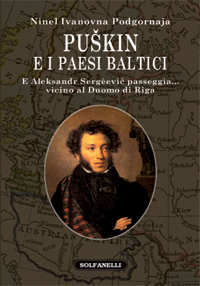 |
Ninel Ivanovna Podgornaja
Puškin and the Baltic Countries
(Solfanelli Editore- Chieti)
Italian version by
Alfredo Bertollo & Pier Luigi Coda |
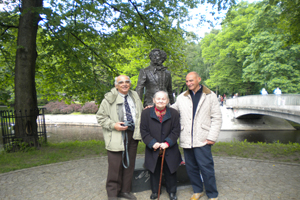
Alfredo Bertollo,Ninel Podgornaja, Pier Luigi Coda
at Riga under the monument of Puškin |
Following the positive response of critics and audiences of the biography of Mafalda of Savoy by the Russian writer Ninel Podgornaja, always published by the Editions Solfanelli of Chieti, it was consequential proposing to Italian readers another biographical work of great literary effort as "Pushkin and the Baltic States "written by the same author.
|
The texts of Podgornaja, in fact, are particularly remarkable for its simple and easy way of writing, away from academic and literary superstructures, a writer who knows how to select the event from the news, readability, even inside the winding paths of historical events and political . His literary style is immediately striking for descriptive simplicity and, above all, to know how to penetrate inside the life of the character of whom she writes: so with Mafalda of Savoy, as with Pushkin.
|
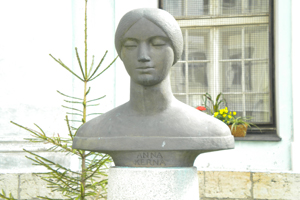
Riga: the monument to Anna Kern |
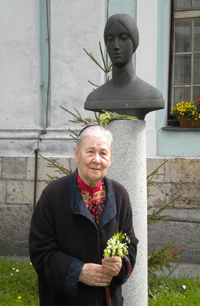
N.Podgornaja pays triburte to Anna Kern at Riga |
But we must point out a detail of great importance: the figure of Princess Mafalda in Italy arouses a great interest for years, about her is running a lot of literature, ultimately the Italian television has broadcast a drama, Pushkin is not as well known, certainly not as popular. The name of Pushkin, of course, is generally known because he is a universal poet, and his work is known by literary scholars, lovers of poetry and Slavic studies in general. In addition, it remains difficult to translate his poems in good Italian. In addition the translations available are not very reliable, and as consequence in the Italian version, you lose the charm, the intimate sound of the verse, the musicality of the word , in short, the quality and thickness of the great poet.
|
Of course, this happens a little 'to all the poets of the world when they are translated into another language: Dante Alighieri, Shakespeare, Goethe, Baudelaire. But in Western languages as English, Spanish, French or German are fairly well known and many readers can directly compare the translated text with the beauty of original. The Russian language, is not as widespread and this is the main reason why Pushkin is a sort of an “icon”, a name symbolic of universal poetry, without, moreover, to be really popular. In addition it must be said that the Russian language, so far, not much studied in Italian schools
Right:the bust of Puškin at Museum Puškin of Riga
|
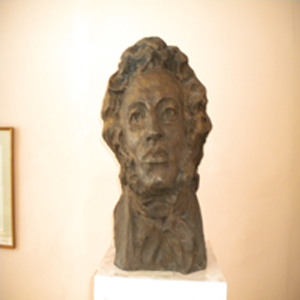 |
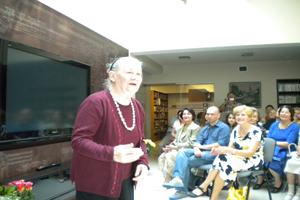
Riga, May 30, 2011, N. Podgornaja during the presentation of the book "Pushkin and the Baltics States" to the Library
|
Among other things it would seem that this grandiose poetic aura that surrounds the figure of Pushkin relegating him to an Olympus mysterious and far away, penalizes even his works of fiction. Apart from "The Queen of Spades", which fortunately has a certain resonance, his stories are quite marginalized. It is a shame because Pushkin is a writer refined and attentive and, oddly enough, of surprising topical interest.
The book of Podgornaja, has two great merit: the first is to raise awareness of Pushkin in Italy through his biography, the second to make known the Baltic countries in a very original way: through the genius of Pushkin that curiously, it seems he was never physically in these countries. The Podgornaja was the founder and director of the Pushkin Museum in Riga for several years and conducted a television broadcast on Latvian National Network dedicated to this great poet. "Pushkin and the Baltics" is the result of a personal documentary and iconographic research managed through research and insights in various locations in the Baltic countries which, in some way, have had reference or relationship, direct or indirect, with Pushkin.
|
Today we want to build Europe, the knowledge and closeness between peoples passes through works like the one deserving of Podgornaja. In this is we must believe and trust: the culture as the glue between nations of distant historical traditions.
|

